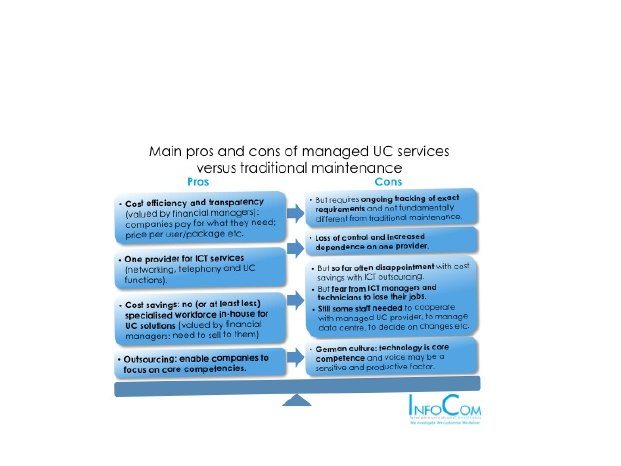Through extensive talks with the wide-ranging audience, InfoCom identified two most common arguments used to support the go-to-market approach for managed services. One of these is that companies that choose Managed UC outsource non-core processes and are able to focus on their core competencies. The other very frequent and recurring argument is that such companies would allegedly reduce costs. “Whilst this may be indeed true in many cases, these advantages are nonetheless not always obvious and not universally true”, InfoCom Chief Analyst commented. “The perception of “core competence” is subjective and fluctuate from company to company”, the Analyst further stressed, “and some companies do consider technology as a core competence necessary to support their business”. Additionally, many companies wish to have direct control of their own communication tools, seen as sensitive areas in relation to security and privacy. In some companies, technology is seen related to productivity, especially where communication tools need to be integrated with existing enterprise application software. In this case, companies reckon that full control of their communication tools allows to better monitor their efficiency and their ability to quickly implement correcting actions, therefore has a direct impact on their productivity.
Eventually, the research highlighted that the argument about cost savings has often disappointed in real deployments and most of the benefits may accrue outside of the company. Several aspects, can impact the costs of the implementation significantly, such as time and effort to transfer knowledge; security breaks through remote working; potential loss of intellectual property and business process secrets; corporate culture change and, sometime, even language barriers. Hidden costs and operating differences are often underestimated and may offset the savings. Additionally, managed services do not mean that the company can transfer all the skilled staff to the provider. Coordination — in relation to further requirements, changes and upgrades — is obviously still within the responsibility of the customer. In the case of onsite managed services, the UC system is located at the customer’s data centre and thus some of its staff still has to manage the data centre and indirectly the UC system.
Other psychological aspects are also often underestimated. With the staff, outsourcing may have a negative connotation as it means some risk to lose their job, or at least to shift employer. And the staff’s attitude may be defensive and resistance to the implementation. Basically, financial managers are more likely to have an open ear for managed services.
On balance, we feel the arguments in favour of managed UC services outweigh the counter-arguments only very slightly. It is fundamental to understand that each company may come to different conclusions regarding managed UC services, depending on its culture, its attitude towards outsourcing or keeping control; as well as depending on its structure (many small distributed sites or only a few large sites) and its technological choices. Consequently, there isn’t a single overall conclusion valid for all companies.
About this extract: This extract in based on InfoCom recent study, which examines the international market for managed unified communications (UC) services. The study is a strategic assessment of go-to-market strategies for these services, with large details regarding pricing, pricing trends and service features. If you are interested in this report, do not hesitate to get in contact with us. Talk to us. We listen.

